So, the year is again new. Your tree has reached its final resting place, along with Ho-Ho and other Christmas decor. Now you’re ready to tackle 2018.
We love this time of year, don’t we? A fresh calendar seems to awaken our dormant willpower and ignite our visions of a better self.
Tis the season for tightening up those “loose ends” (flabby arms, saggy hind-ends, and so on) and saving money. Have you ever noticed, though, that most of our goals focus on externals?
Rarely do we give much attention the unseen parts of us, the foundations that shape our thoughts and decisions. Why, I’m not sure. Maybe because the unseen is difficult to measure. Maybe because, assuming we follow through, we can’t easily share our accomplishment on Facebook.
Regardless, if we intend to combat the capital sin of our age – superficiality – we need to establish below-the-surface goals.
Scripture is a logical and essential starting point. My assumption is, however, you’ve used the Bible as an excavation tool for some time. And that you will continue doing so.
Aside from the Bible, though, in building spiritual roots, I’ve found it helpful to engage with and listen to people who’ve been there. So, I’ve put together a list of books that have challenged me to explore the depths of faith, to call old ways of thinking into question, to let go of who I thought I was for who God created me to be.
These books are not inextricably connected. It’s not necessary to read them all (or in any particular order), though you’re assured a special crown in Glory if you do. Reading even one of these books will do the job, if you have eyes to see.
Here are 8 books that will help you build deep spiritual roots.
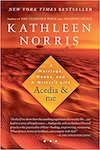 Acedia & Me (Kathleen Norris)
Acedia & Me (Kathleen Norris)
Acedia is an ancient spiritual word that just means the absence of care. And, I could argue, care is exactly what’s void in our modern-day world. We’re more concerned with who’s Tweeting what or how many likes our latest post received, both of which have zero importance in the grand scheme.
Acedia is spiritual apathy or indifference, disinterest in the things of God. It’s sin. This book reveals all the many ways acedia creeps into our hearts and how we are to fight back against it.
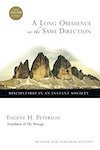
A Long Obedience in the Same Direction (Eugene Peterson)
Here’s an excerpt from the introduction. Mic drop caliber stuff from Eugene Peterson.
“The persons whom I lead in worship, among whom I counsel, visit, pray, preach and teach, want shortcuts. They want me to help them fill out the form that will get them instant credit (in eternity). They are impatient for results. They have adopted the lifestyle of a tourist and only want the high points…The Christian life cannot mature under such conditions.”
Hence, why you should read this book.

Learning to Walk in the Dark (Barbara Brown Taylor)
So, I’m not sure what I expected from this book. Whatever it was, Barbara Brown Taylor (or BBT, as I affectionately refer to her…we’re super close like that, even though I’ve never met her) didn’t deliver. And I’m so thankful.
“Christianity has never had anything nice to say about darkness,” BBT says. With conviction and grace, she explains why this is a problem, why we need darkness as much as light and how we must learn to navigate darkness if we expect to find wholeness. I bet my mom’s salary you haven’t read a book like this one. I also guarantee it will help you see and understand darkness in a fresh…light? (see how I did that?)

A Crazy, Holy Grace (Frederick Buechner)
As a writer, well probably just as a human, you happen across people you’re convinced would be your best friend if only you’d been given the opportunity. Like a kindred spirit, I guess. Or like a bromance, except healthy. Frederick Buechner is that person for me.
He just writes with a tone that jives with my spirit. It’s graceful, hopeful, convicting. Frederich Buechner knows that he doesn’t know. This gives his words authority. Add to them his life experiences (father committing suicide as a child, not growing up in a Christian home, among others), and you have the stuff of something transformative. This book talks about pain and suffering in a way only Buechner can. You will be blessed by for reading it.

The Road Back to You (Ian Cron and Suzanne Stabile)
The Enneagram is not the Savior (or even close). But no single tool has been more effective at chiseling away the dividing walls I’ve consciously and subconsciously erected, walls that have hindered my horizontal relationships (my marriage and friendships) and vertical relationship (with God).
If you want to grow in your self-awareness and capacity for love and empathy, the Enneagram will help you. The journey will not be easy (it never is when confronting the man in the mirror), but if you allow it, this tool will transform you.
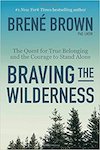
Braving the Wilderness (Brene Brown)
In the first chapter, Brene Brown references Maya Angelou, “You are only free when you realize you belong no – you belong every place – no place at all. The price is high. The reward is great.” This is the thesis of Braving the Wilderness and an ever-important reminder in our uncertain times.
This book is all about the search for true belonging, throwing aside cheap substitutes, learning to be who God created you to be rather than giving in to cultural pressures to think, look or act a certain way.
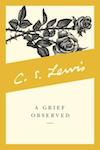
A Grief Observed (C. S. Lewis)
I read this book several months ago, on the heels of my grandmother’s death. I can’t adequately describe its importance in helping me grieve her loss.
Lewis writes A Grief Observed after his wife’s death. A short-ish book that’s huge in vulnerability and honesty. I didn’t quite expect such a tone from a spiritual giant like Lewis. I remember thinking at points throughout the book, “Can a Christian talk like that about God?”
For anyone grieving the death of someone you love, however, you know the journey brings real sadness and anger and real questions about who God is (or who you thought he was). The waves of honesty and vulnerability, however, allow us to navigate the floodwaters of grief without drowning in despair.
And besides, God’s a big boy. He can handle our honesty, our anger, our pain.
When you get this and learn to express these emotions, you realize that God was never up there judging or looking down on you, anyhow.
He’s with you.
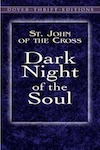
Dark Night of the Soul (St. John of the Cross)
One of the most important books ever written on spiritual growth. Describing its contents to you is a difficult task. Words can’t quite hem them in. I do know Dark Night of the Soul has given hope to many-a-despairing believer over the years (including this one). St. John of the Cross was far ahead of his time in his understanding of the spiritual and the psychological, his realization of the “dark night” as a catalyst for deeper love and relationship with God. It’s one of those books that can save you ((along with the Psalms, of course) if you find yourself in a dark night where God seems absent and hope appears lost.
So, those are my recommendations.
Do you have one you would add to this list? Leave a comment below.
Grace and peace, friends.


Leave a Reply